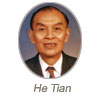AWARDEE OF TECHNOLOGICAL SCIENCES PRIZE
XIE HEPING
Xie Heping, a specialist in engineering mechanics, was born in Shuangfeng, Hunan Province in January 1956. He graduated from the China University of Mining and Technology in 1982 and received his Ph. D. degree from the China University of Mining and Technology in 1987. Then he became a professor there in 1990. He was approved of a doctor candidate supervisor by the Academic Degree Committee of State Council. In 2001 he was elected the academician of the Chinese Academy of Engineering. He serves as the president of Sichuan University, the member of the Subject Evaluation Team of the Academic Degree Committee of State Council, the vice president of Chinese Society for Rock Mechanics and Engineering and vice president of China Coal Society.
He has been working on the theory and application of rock mechanics for a long time. He first proposed a macro damage mechanical model for jointed rock masses in 1980s to characterize its natural properties and the mechanism and process that cause the catastrophe in mines. He applied his model to some related engineering such as prediction of large deformation and creep process of deep tunnels and design of tunnel support. Then he founded a new research area called damage mechanical study on jointed rock masses. In 1985 he introduced creatively fractal geometry to research the discontinuous deformation, strength and fracture of the jointed rock masses, forming a new research issue of fractal study on discontinuous behaviors of jointed rock masses. Connected with damage mechanics, he succeeded in rock burst, ground subsidence and control of roofcoal fragmentation and yielded a remarkable economical and social effectiveness. He made outstanding contributions to continuous and discontinuous rock mechanics and related engineering.
He has authored 5 books in English and Chinese and published over 150 journal papers, with 35 of them in the SCI journals. He was winners of the second class Award of the National Prize of Progress in Science and Technology (2000), the third class Award of the National Prize of Progress in Science and Technology (1999), the third class Award of the National Prize of Natural Sciences (1995). He also received over 10 honors including the Award of Chinese Youth Scientists (1993).






